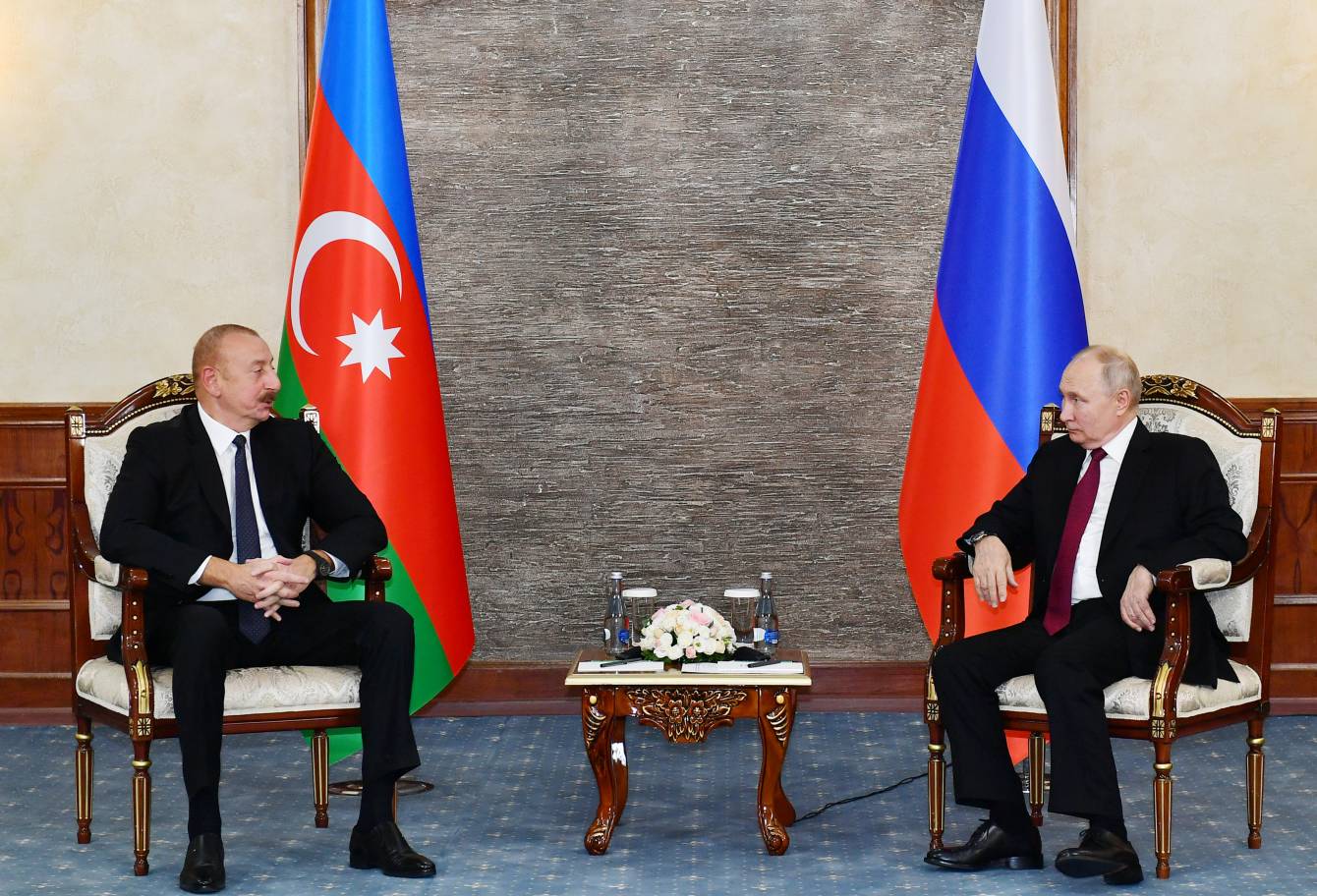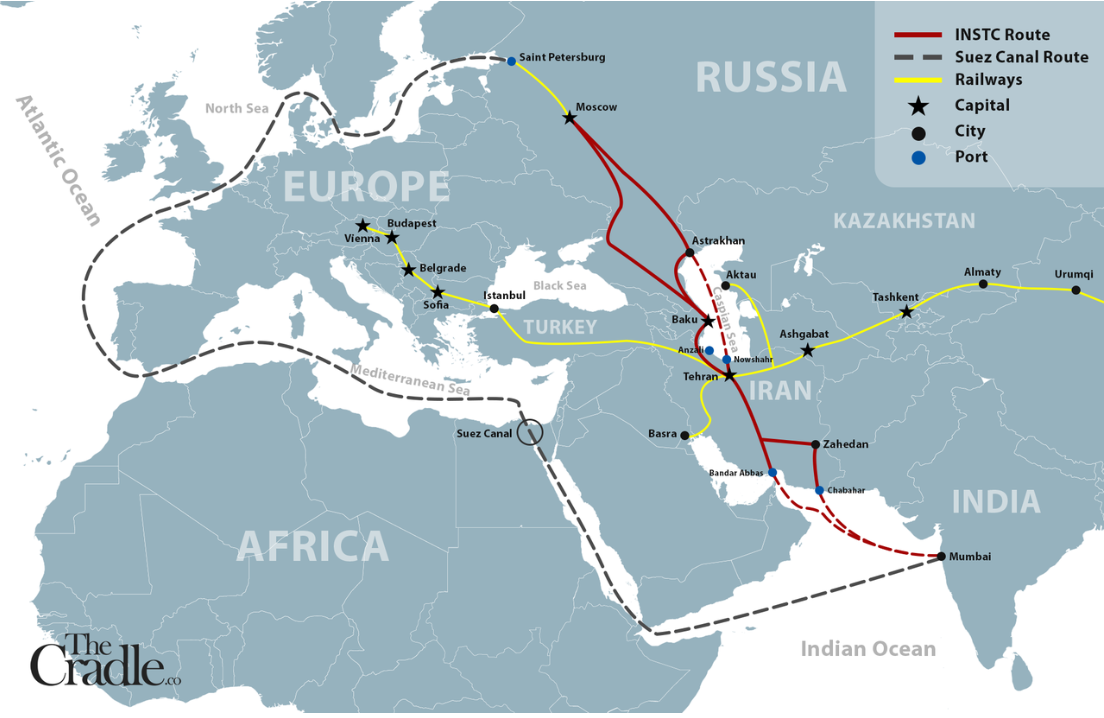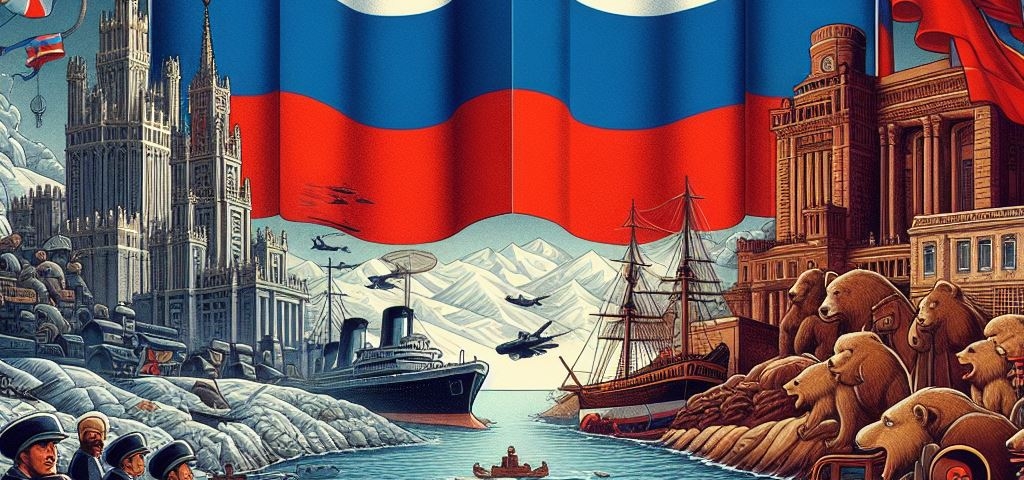Giorgi Bilanishvili
This article is auto-translated, we recommend to read it in original Georgian.
Russia’s military aggression in Ukraine obviously has a much greater geopolitical significance than just a war to occupy the territories of another country and change its foreign policy course. Along with appropriating Ukrainian territories and gaining at least effective influence on its foreign policy, Moscow has at least several main goals:
- weakening of the positions of the West, first of all the USA, in international politics;
- strengthening of anti-democratic and anti-liberal forces in democratic countries;
- deterioration of relations with the West of various, including post-Soviet countries;
- Restoring exclusive influence on other post-Soviet countries except Ukraine.
In this blog, in the context of Russia’s above-mentioned goals, we will review the important processes taking place in the South Caucasus, with a focus on Azerbaijan, the most powerful country in the region from a military and perhaps a political point of view.

www.pspresident.az
Post-Karabakh
After the victory in the Second Karabakh War in the fall of 2020, Azerbaijan made a decisive turning point in the solution of the Karabakh problem, and in September 2023, as a result of a rapid military operation, it completely recaptured this region, many people probably strengthened their belief that Russia has lost an important lever of influence on Azerbaijan. This is objectively so, because Moscow, as a rule, effectively uses conflict foci to influence one or another country.
Azerbaijan’s strength and Russia’s weakness seemed to be confirmed by the fact that Moscow did not interfere with Azerbaijan either during the Second World War or after it, despite the fact that it had a strategic partnership with Armenia. Although Moscow never had the need for this, because it was constantly violating the norms of international law, but it also had a legal basis for supporting Armenia. Such an obligation was imposed on Moscow by a bilateral agreement, Armenia’s membership in the Collective Security Treaty Organization (CSTO) and the joint statement of President Aliyev, Prime Minister Pashinyan and Putin on November 10, 2020, on the basis of which the second Karabakh war was terminated and a new status quo was established.
Under the conditions of the new status quo, Moscow received a new and quite important lever of influence. In particular, based on the aforementioned statement, Russian “peacekeepers” were deployed in the conflict zone (paragraph 4) [1], including in the Lachin corridor connecting Karabakh with Armenia (paragraph 6). Despite this, in December 2022, Baku blockaded the Lachin Corridor, thereby gaining an opportunity to increase pressure on the non-controlled part of Karabakh. This pressure was consistently strengthened and in September 2023, it recaptured all of Karabakh in a quick military operation, after which the Armenian population left this area.
“Peacekeepers” did not take effective measures during the escalation of the situation, both in the above-mentioned and other times, however, they remained in Karabakh until recently. Their stay there was due to expire in 2025, with the possibility of an automatic five-year extension, and although Baku did not request it, Moscow recently withdrew them from Azerbaijan.
According to some researchers, such a policy of Russia was due to the expectation of a decision from Baku corresponding to the interests of Moscow. Azerbaijan’s possible accession to the Eurasian Economic Union (EAEU) was considered as such. However, at the international conference held in Baku in April, Ilham Aliyev rejected such a possibility in diplomatic language. According to him, “They do not have such a plan, but they do not say that this issue cannot be discussed in the future. Everything will depend on how much economic benefit we get from rapprochement. If we see it, then we will make a decision.”
Russia’s strategy of maintaining influence on Azerbaijan
Despite all this, it is clear that Moscow’s intention to maintain its influence on Baku has not slowed down, and for that, it seems to be building its strategy quite conveniently. This strategy is likely to strengthen Russia’s influence on Azerbaijan as a result of deepening cooperation in areas of convergence of interests and to replace Pashinyan’s government in Armenia with pro-Russian forces. We should consider the following as areas of convergence of interests between Russia and Azerbaijan:
Negative attitude towards the influence of the West in the South Caucasus – according to Duma deputy Dimitri Saveliev, the head of the Russia-Azerbaijan inter-parliamentary friendship group, “Russia-Azerbaijan have a united position against the destabilization of the military-political situation in the South Caucasus by “external players”. It seems that Baku does not like the presence of the EU observation mission in Armenia, along with the deepening of cooperation between Armenia and France in the military field. According to the official Baku assessment, after Canada joined this mission, it turned into a de facto NATO mission and a tool of anti-Azerbaijani propaganda. It is significant that a little later the Russian Foreign Minister Lavrov made the same statement. Apart from that, many other things annoy Moscow in relation to Armenia. Among them are Yerevan’s push to deepen its relationship with the EU and its decision to suspend its participation in the de facto CSTO.
Against this background, the context of the statements made by Russia towards the Armenian government also draws attention. The Ministry of Foreign Affairs of Russia often uses terminology similar to Ukraine in relation to official Yerevan, when it refers to the Armenian government as “the rulers of Yerevan” and often emphasizes that, unlike them, Russia does not have a problem with the Armenian people. Russian propaganda is also quite active in relation to the Armenian government, which obviously spreads the context and content of the statements made by the Ministry of Foreign Affairs.
Trade relations and economic projects in Azerbaijan – At the beginning of April, the Minister of Economy of Azerbaijan was on a working visit to Moscow. During meetings held with the Vice Prime Minister/Minister of Production and Trade of Russia, Minister of Economy, Chairman of the Central Bank, heads of various commercial structures and companies, it was noted that bilateral trade is growing, as both countries attach great importance to it. Indeed, Russia is one of the main trade partners for Azerbaijan. Trade between these countries increased by 17.5% in 2023 compared to the previous year. At the same time, Russia is in the first place among the importers of oil products of Azerbaijan.
In the next 10 years, the Russian company Lukoil will receive 7 billion US dollars in profit from the Shah Deniz gas fields in Azerbaijan, from which gas is supplied to the EU countries. Lukoil owns 19.9% of this deposit. After the EU decided to reduce its dependence on Russian gas in 2022, it signed a new agreement with Azerbaijan, on the basis of which Azerbaijan’s gas exports to the EU increased from 8.1 billion cubic meters to 11.4 billion cubic meters. On the other hand, from November 2022, Gazprom resumed gas supply to Azerbaijan and until March 2023, it supplied 1 billion cubic meters of gas. Although Azerbaijan itself owns considerable oil and gas reserves, it is probably in its interest to receive gas from sanctioned Russia at a lower market price. If nothing else, it increases its gas exports to the EU. Against this background, President Aliyev is talking about the prospect of supplying gas to Armenia at a preferential price, which may, under certain conditions, become a mechanism for further increasing influence on Armenia.
The number of enterprises in Azerbaijan with Russian capital exceeds 1400. 300 of them are created entirely with Russian capital, and the rest have the form of joint ventures. Recently, the Russian automobile company AvtoVAZ started producing cars in Azerbaijan. There is a similar plan regarding the start of Russian railway and aviation production in Azerbaijan. This will undoubtedly be a positive event for Russia, which is under Western sanctions, which also provides for limiting the supply of products to Russia necessary for such production.
Large-scale international projects – Russia sees confrontation with the West as a long-term perspective and has already begun to reorient itself to new consumer markets and logistics routes. One such route is the North-South Transport Corridor (INTSC). It consists of 7,200 km long road, rail and sea routes connecting St. Petersburg through Azerbaijan and Iran to the Indian port city of Mumbai.
Recently, President Aliyev was in Moscow, where special attention was paid to the implementation of INTSC during the meeting with Putin. In terms of importance, Putin compared this project to the Baikal-Amur (BAM) transport highway built during the Soviet period, and he did not spare praise for Heydar Aliyev, the father of the President of Azerbaijan, who at the time was in charge of the construction of BAM. Aliyev emphasized the great importance of INTSC and also noted that in terms of security, Russia is a fundamental country in the Caucasus and a wider geographical area.
For INTSC to be operational, it is necessary to build a 164 km long railway section of Rasht-Astara on the territory of Iran, for which the agreement was made in 2023, and the works should be completed within three years.

Maintaining control over Armenia-Azerbaijan peace talks – After the end of the Second Karabakh War, the West tried to become a mediator in the Armenia-Azerbaijan peace talks. For some time, he took the initiative and several high-level meetings were held in Washington and Brussels. On the other hand, Moscow did not give up the role of mediator. At the same time, Azerbaijan was angry with the West, and Armenia was angry with Russia. As a result, Azerbaijan insisted on continuing peace talks in a bilateral format, without mediators. Probably, with Moscow’s intervention, this issue was finally resolved in such a way that the foreign ministers of Azerbaijan and Armenia agreed to hold peace talks in Kazakhstan (Almaty). With this, Moscow fulfilled its own task at least partially, because it removed Washington and Brussels from the mediation, while it itself remained indirectly in the process.
Before the Almaty peace talks begin, Azerbaijan and Armenia agreed to hand over four villages in the north-east of Armenia to Azerbaijan within the framework of the State Border Delimitation-Demarcation Commission. This was followed by protests and blocking of roads in different regions in Armenia. Among them, the Georgia-Armenia highway near the village of Kirantsi was blocked for a week. Although the parties agreed to continue the process of delimitation and demarcation of the state border, it seems that a skeptical attitude towards this process prevails in Armenia. According to Tigran Grigoryan, head of the Yerevan Democracy and Security Center, Azerbaijan wants peace on its own terms, which is the peace of the winner. According to him, Azerbaijan is not interested in the delimitation-demarcation of other sections of the border, because it has occupied the territories of Armenia in the south. In this, it primarily refers to the areas around the city of Jemruk in the Vayotzori district. In order to strengthen his position, Grigorian also uses the words of President Aliyev, who said in an interview with Jemruk in January that we should maintain our positions at such heights that would allow us to see what the Armenian side is planning.
The severity of the situation for Armenia is confirmed by Prime Minister Pashinyan, who says that the border delimitation-demarcation process is painful, but it is the one that decides the issue of Armenia’s existence in the near future – there is simply no other choice. As a result, although the Karabakh conflict no longer exists, many difficult and unsolved problems remain between Armenia and Azerbaijan, which is primarily in the interests of Moscow, especially since it indirectly influences this process.
Conclusion
In addition to the above, Moscow has other levers to influence Baku and weaken Pashinyan’s positions, which have not been covered in this blog. The future will show whether Moscow’s strategy will be enough to strengthen its influence on Azerbaijan. On the other hand, Azerbaijan is a serious player in the South Caucasus, and its strategic partnership with Turkey strengthens its back. It is also a fact that the government of Azerbaijan can make its own calculations. First of all, Baku’s planned and consistent action in relation to Karabakh can be proved, which brought the desired result.
On the other hand, Georgia can play a potentially essential role in Moscow’s strategy towards Moscow and the South Caucasus in general. This topic is probably especially important, in the light of Georgian Dream’s reversal of the Russian law in the parliament and completely inappropriate statements made in recent years towards our strategic partners, which has become a trend in recent years. If the Georgian dream succeeds, Moscow will restore control over Georgia. On the one hand, this circumstance will turn into an important lever of influence on Baku, because a route completely controlled by Russia will be created in the northwest of Azerbaijan. On the other hand, the chances of Armenia’s European integration will practically be reduced to a minimum.
[1] The peacekeeping contingent was deployed for a period of 5 years, with the condition that this period would be automatically extended for another 5 years, if none of the signatories to the statement requested its withdrawal 6 months before the expiration of their term.




